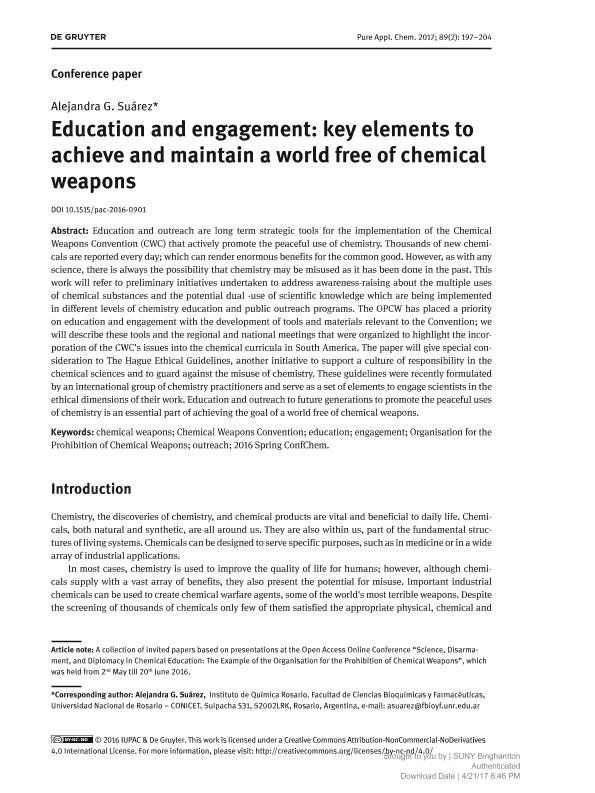Mostrar el registro sencillo del ítem
dc.contributor.author
Suarez, Alejandra Graciela

dc.date.available
2018-07-27T13:51:15Z
dc.date.issued
2017-02
dc.identifier.citation
Suarez, Alejandra Graciela; Education and engagement: Key elements to achieve and maintain a world free of chemical weapons; Int Union Pure Applied Chemistry; Pure and Applied Chemistry; 89; 2; 2-2017; 197-204
dc.identifier.issn
0033-4545
dc.identifier.uri
http://hdl.handle.net/11336/53281
dc.description.abstract
Education and outreach are long term strategic tools for the implementation of the Chemical Weapons Convention (CWC) that actively promote the peaceful use of chemistry. Thousands of new chemicals are reported every day; which can render enormous benefits for the common good. However, as with any science, there is always the possibility that chemistry may be misused as it has been done in the past. This work will refer to preliminary initiatives undertaken to address awareness-raising about the multiple uses of chemical substances and the potential dual -use of scientific knowledge which are being implemented in different levels of chemistry education and public outreach programs. The OPCW has placed a priority on education and engagement with the development of tools and materials relevant to the Convention; we will describe these tools and the regional and national meetings that were organized to highlight the incorporation of the CWC's issues into the chemical curricula in South America. The paper will give special consideration to The Hague Ethical Guidelines, another initiative to support a culture of responsibility in the chemical sciences and to guard against the misuse of chemistry. These guidelines were recently formulated by an international group of chemistry practitioners and serve as a set of elements to engage scientists in the ethical dimensions of their work. Education and outreach to future generations to promote the peaceful uses of chemistry is an essential part of achieving the goal of a world free of chemical weapons.
dc.format
application/pdf
dc.language.iso
eng
dc.publisher
Int Union Pure Applied Chemistry

dc.rights
info:eu-repo/semantics/openAccess
dc.rights.uri
https://creativecommons.org/licenses/by-nc-sa/2.5/ar/
dc.subject
2016 Spring Confchem
dc.subject
Chemical Weapons
dc.subject
Chemical Weapons Convention
dc.subject
Education
dc.subject
Engagement
dc.subject
Organisation For the Prohibition Of Chemical Weapons
dc.subject
Outreach
dc.subject.classification
Otras Ciencias Químicas

dc.subject.classification
Ciencias Químicas

dc.subject.classification
CIENCIAS NATURALES Y EXACTAS

dc.title
Education and engagement: Key elements to achieve and maintain a world free of chemical weapons
dc.type
info:eu-repo/semantics/article
dc.type
info:ar-repo/semantics/artículo
dc.type
info:eu-repo/semantics/publishedVersion
dc.date.updated
2018-07-26T13:58:11Z
dc.journal.volume
89
dc.journal.number
2
dc.journal.pagination
197-204
dc.journal.pais
Estados Unidos

dc.journal.ciudad
Nueva York
dc.description.fil
Fil: Suarez, Alejandra Graciela. Consejo Nacional de Investigaciones Científicas y Técnicas. Centro Científico Tecnológico Conicet - Rosario. Instituto de Química Rosario. Universidad Nacional de Rosario. Facultad de Ciencias Bioquímicas y Farmacéuticas. Instituto de Química Rosario; Argentina
dc.journal.title
Pure and Applied Chemistry

dc.relation.alternativeid
info:eu-repo/semantics/altIdentifier/doi/https://dx.doi.org/10.1515/pac-2016-0901
dc.relation.alternativeid
info:eu-repo/semantics/altIdentifier/url/https://www.degruyter.com/view/j/pac.ahead-of-print/pac-2016-0901/pac-2016-0901.xml
Archivos asociados
